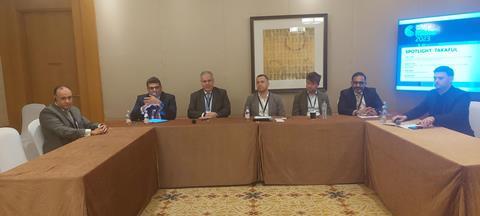Collaboration between takaful providers is essential if the niche industry is to achieve its potential
Collaboration between takaful providers is essential if the niche industry is to grow, achieve its potential and learn some of the lessons of the past.
First and foremost, takaful models must be financially sustainable – providing a return for shareholders - and they must be a viable choice for a broader base of customers.
This is according to a panel of experts speaking on Day Two of the Dubai World Insurance Congress 2023 (DWIC).
| Roundtable discussion: Spotlight takaful |
|---|
| NEELMANI BHARDWAJ CEO, TAKAFUL OMAN |
| DR ILKER ASLAN SENIOR ADVISOR, SYNPULSE MANAGEMENT AND TECH CONSULTING |
| PARVAIZ SIDDIQ Independent |
| MOHAMED SAAD FCII-Chartered Insurer, SEO, Africa Re DIFC |
| ATINC YILMAZ Regional CEO - Turkey, North Africa & The CIS Countries | Chairman of Multinational Clients Practice TMEA, Howden Brokers |
| VASILIS KATSIPIS General Manager, Market Development, MENA South and Central Asia at AM Best |
| MICHELE GROSSO Co-Founder and CEO of Democrance |
| TREVOR TREHARNE, APAC editor, Global Reinsurance |
It comes down to rethinking the market’s value proposition, thought the panel. “If takaful is to succeed it has to succeed financially first,” said one speaker.
It is only by working together that the challenges can be ironed out and successes shared, thought one speaker. He pointed out there were just two takaful operators in the Oman insurance market, which made it extremely difficult to benchmark best practice.
“Some parts of [the sector] are very good, approaches which we can borrow,” he said. “But where is the dialogue?”
A lack of standardisation from one market to the next is stifling growth, with very difficult takaful models in Malaysia, the markets of the GCC, Turkey and North Africa.
Presently there is too much cost in the system and too many stakeholders to answer to, including the Shariah board, with management caught in the middle.

Improve distribution and marketing
Part of this involves a rebrand, with the product being better marketed as a suitable alternative to traditional coverrs.
The panellists pointed out that takaful is much more than Islamic insurance and that more needed to be done to market the benefits it offers to a broader market.
“It’s not just about Shariah compliance,” said one speaker. “It’s about ethical insurance and it doesn’t matter what religion your client is. Many companies started with the best of intentions, but have morphed into something unrealistic.”
“There is a lack of awareness about takaful outside of the Muslim countries,” said another. “It should be promoted as a viable alternative for ESG-conscious consumers.”
Too much competition in personal lines
Another missed opportunity came from a narrow focus on motor and health classes of business - the compulsory personal lines in many Muslim markets. While these may be the easiest lines to administer, the issue here is that customers nearly always select cover based on the price as the main criteria.
“What is the benefit to the buyer of takaful motor insurance?” asked a panellist. ”For the person in the street, why should they pay more for that?”
Instead, the market should branch out and consider opportunities where the ethical qualities of the product will hold more appeal. “We should create a takaful alternative to every line of business so long as there is a need for it,” said one panellist.
It is still early days in the development of the sector, however, pointed out another. “Takaful is only 50 years old, and it will take time to mature,” he said.










No comments yet